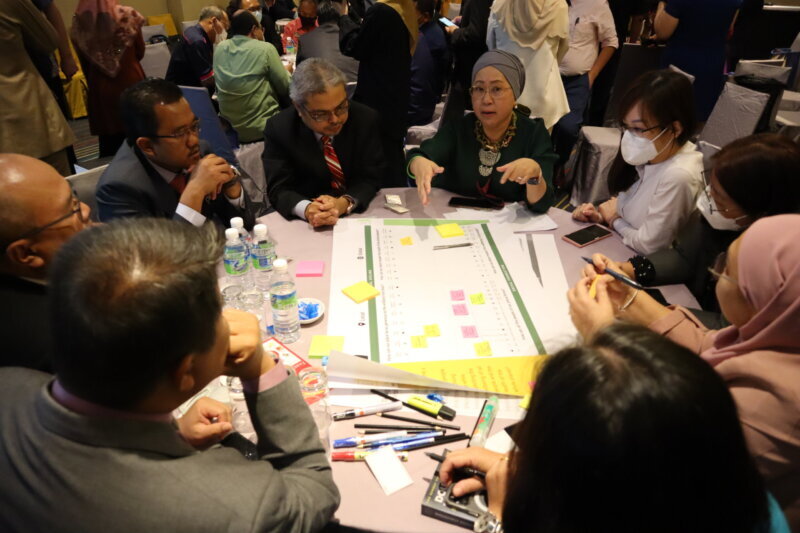Professor Tan Sri Dr. Jemilah Mahmood is the Executive Director of Sunway Centre for Planetary Health, hosted at Sunway University, Malaysia. Established in 2021, the Centre focuses on the climate emergency, creating healthy cities and achieving sustainable food systems, recognizing the centrality of good governance, effective communications and an education revolution to effect long-term system level changes to the relationship between planet and people. It forms part of Sunway Group’s focus on achieving sustainable development in Malaysia and fostering regional cooperation for environmental action.
CAPS spoke to Dr. Jemilah in late 2022 to learn more about planetary health – the intersection of human health, planetary health and sustainable resilience – and the role of private social investment in addressing existential crises in the Asian region.
CAPS: Dr. Jemilah, thank you for taking the time to speak with us. Could you start by explaining the relationship between the health of people and the health of the environment?
Dr. Jemilah Mahmood: It’s abundantly clear by the events of the last three years that the health of humanity is intrinsically linked to the health of the planet. There are limits to the amount of stress the planet can take before we start to experience systemic collapse, until those tipping points that science is telling us to be worried about are reached. When we start transgressing those boundaries there is a massively negative impact on the systems that are important for humanity: health, food, water, energy. This damage in turn impacts on our economic well-being, our social cohesion, gender relations, equality, education, everything. One event can generate cascading crises, as we saw during the pandemic when we experienced this up close and personal. There are so many things that are affected when health is not protected.

CAPS: That sounds incredibly complex.
Dr. Jemilah Mahmood: It’s complex because, when it comes down to it, everything in nature is connected. The disconnection is with us – we are not connected anymore. This is because our political, economic and social systems have evolved in ways which are simply not sustainable, not respecting the limits of the Earth’s ability to provide for us, to clean up our messes, to process our trash and the toxins we create, to protect us from poorly thought through development choices. And it’s starting to more immediately touch upon a lot of sensitivities. For example, in Malaysia, the massive flooding in late 2021, generated a huge tension in politics. People felt that the government wasn’t taking care of them. People didn’t talk about climate change until it impacted them, until the triple crisis of the pandemic, the floods and then economic recession became very personal.
There is no escaping the fact that human beings drive environmental and planetary destruction, whether through their own consumer behaviors, though silent acquiescence to damage caused by big businesses and corrupt politicians or simply through participating and accepting the poorly thought through development decisions our leaders and private sector managers make – decisions that don’t take into account planetary boundaries or respect for nature. So, we are trying to get people to flip it and see things from a different perspective.
CAPS: How easy or difficult has it been for you to get people to shift that mindset?
Dr. Jemilah Mahmood: Every crisis provides opportunities. In the immediate aftermath of disasters it’s easier for us to talk to governments, to say, “Here’s the situation, you need to act.” The pandemic provided a significant opportunity to open dialogue on the need for more sustainable change and better risk management. The government has included planetary health and climate change in its development plans. The caretaker Prime Minister at the time called for a planetary health roadmap. We have a sustainability centre, bringing the SDGs into our development planning, and we’re setting up a sustainability fund so that we can look at what innovations can happen at the community level to drive sustainable transformation. It is still tricky, but it is not impossible.
I think that everyone needs to use this opportunity, making sure we don’t forget that the pandemic showed us the need for speed, to keep driving forward the transformational change that must happen now, especially because governments and people have so many competing priorities. For the normal person on the street, it is about, “How do I bring food to the table?”, and for politicians, it’s about, “How do I survive?”. For businesses, “How do I make money?”. Doing business well and right means good business outcomes. For governments, making the right policy decisions will ensure better political survival and thriving. But the ultimate driver of positive change needs to be us – the people. Changes in our behaviors will be reflected in changes in our institutions which will generate change in our interactions with the Earth.

CAPS: We often hear people say that sustainability and climate change seem too big and too complicated, and it’s difficult to know where to start. How would you respond to that concern?
Dr. Jemilah Mahmood: There’s no short-term or easy solution to this. This is going to be hard work for a long time to come – but we’re running out of time to get started. In my opinion, the most important thing is education. How do we build an awareness of the importance of the environment, of sustainability, of planetary health? It needs to start from a very young age, in schools.
At the University, we prioritized incorporating planetary health as a central theme, no matter what discipline you are in. We are piloting a course now, that will become mandatory from 2024. Every student entering Sunway University will need to complete a seven-week course on planetary health and community service before they graduate. In the process of educating people, you create greater awareness and develop leadership skills.
We also run a lot of youth engagement activities. I think that’s a factor in how we change things in the long term, through young people. They already know this is important. They know that their generation is facing an existential crisis. We give them the tools and the skills so that they are better able to handle it, but also build that transformative innovation that is required to develop solutions for us all.
CAPS: What role can philanthropists play in supporting businesses and communities to take action on planetary health?
Dr. Jemilah Mahmood: I think philanthropy would do well to increase its focus on impact. That’s where the real value for money lies. But a lot of the time, philanthropy is not strategic. For example, when there’s a crisis, everybody pours money into relief, but funders are less willing to provide money that helps to prevent these crises from happening in the first place. I want to see philanthropists think about strategy and impact, more intelligent theories of change, and long-term progress.
Philanthropy also has such an important role to play in building institutions. I would love for our Centre to have endowments to help us do research and build the evidence to change society through education and influencing policies. We also want to influence businesses, including SMEs, to look at how they can innovate and to help them become more aware of their environmental impact. We have to get people to see that protecting the environment is good business and good FOR business.

